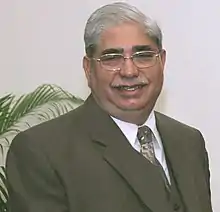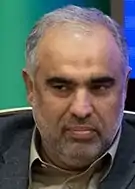Speaker of the National Assembly of Pakistan
The Speaker of the National Assembly (Urdu: اسپیکر قومی اسمبلی); informally as Speaker National Assembly, is the presiding official of the National Assembly of Pakistan– a lower house of the Parliament of Pakistan.[1]
| Speaker of the National Assembly of Pakistan | |
|---|---|
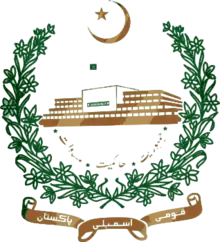 | |
| National Assembly of Pakistan | |
| Style | Mr. Speaker (Informal; while presiding the house) Honourable Speaker (Formal) |
| Status | Presiding officer |
| Seat | Islamabad |
| Nominator | Political parties |
| Appointer | Elected by the National Assembly |
| Term length | As long as the current assembly remains in power, the Speaker continues to exercise its authority |
| Formation | Constitution of Pakistan (12 April 1973) |
| First holder | Muhammad Ali Jinnah (11 August 1947) |
| Succession | Second |
| Deputy | Qasim Suri |
| Website | Speaker National Assembly |
The office has its roots in 1947 and was reestablished in 1973 in accordance to the Constitution; the speaker presides over the chamber composed of people's representatives elected on the basis of universal franchise.[2] The Speaker is Second in the line of succession to the President of Pakistan and occupies fourth position in the Warrant of Precedence, after the President, the Prime Minister and the Chairman of Senate.[3] In addition, the Speaker is the spokesman of the National Assembly to the outside world, and is non-partisan in his approach.[3]
To exercise the great authority that stems from the respect, affection and consideration which every Member of the House bestows upon the holder of this high office, the Speaker shows complete impartiality in the discharge of his or her functions.[3] When the National Assembly is dissolved he or she continues in his office, till a new Speaker is elected.[3]
Role and responsibilities
The office of Speaker of the National Assembly is created by Article 53 of the Chapter 2 in Part III of the Constitution of Pakistan:[3]
After a general election, the National Assembly shall, at its first meeting and to the exclusion of any other business, elect from amongst its members a Speaker and a Deputy Speaker and, so often as the office of Speaker or Deputy Speaker becomes vacant, the Assembly shall elect another member as Speaker or, as the case may be, Deputy Speaker.
— Article 53(1)–53(2) of the Chapter 2: The Parliament: in Part III of the Constitution of Pakistan, source[3]
The Speakership of the National Assembly is a leadership position and the office-holder actively works to set the majority party's legislative agenda. The Speaker usually does not personally preside over debates, instead delegating the duty to members of the House from the majority party. The Speaker usually does not participate in debate and rarely votes.[3]
History
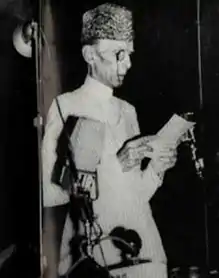
The first Speaker/President of the National Assembly of Pakistan, Muhammad Ali Jinnah was elected unanimously by the Constituent Assembly of Pakistan on 11 August 1947. He served from 11 August until his death on 11 September 1948. The Deputy President of the Constituent Assembly, Maulvi Tamizuddin Khan was then elected President who served two separate terms in that capacity.[4] Only two speakers in the history of Pakistan have gone on to become Prime Ministers, Zulfikar Ali Bhutto who served as speaker from 14 April 1972 to 15 August 1972 and Yousaf Raza Gillani who served from 17 October 1993 to 16 February 1997.
List of Speakers
List of Speakers of the National Assembly
These are the names of Speakers and presidents of the National Assembly of Pakistan.
Muslim League/Convention Muslim League
Pakistan Muslim League/IJI/Pakistan Muslim League (N)
See also
References
- Pakistan Country Study Guide Strategic Information and Developments. United States: Intl Business Pubns USA. 2012. ISBN 1438775253.
- Akbar, M.K. (1997). Pakistan from Jinnah to Sharif. New Delhi: Mittal Publications. ISBN 8170996740.
- Article 53(1) of the Chapter 2: Parliament in Part III of the Constitution of Pakistan
- "National Assembly of Pakistan". www.na.gov.pk. Retrieved 19 June 2019.
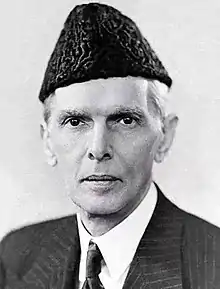
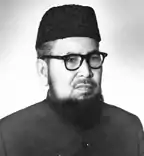
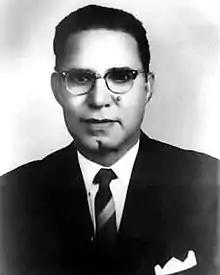
_(cropped).jpg.webp)
